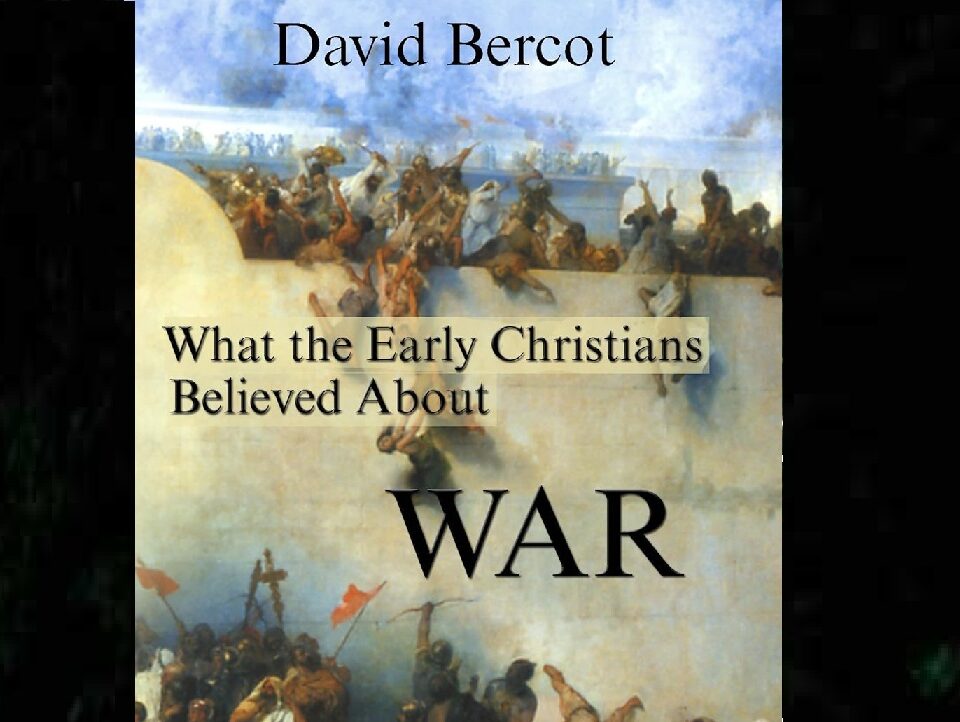Part of “Towards the Cessation of Church Suicide,” A.F. Buzzard, A Journal from the Radical Reformation, Vol. 5 No. 4, 1996.
The only antidote to the centuries-long Constantinian concubinage into which churches have fallen is a strongly confessional theology of peace. The church must constantly bring to mind the horror of what is even now still contemplated as a reasonable way of effecting a permanent peace. It must insist that plans to destroy the earth invite the wrath of God, not salvation (“God will destroy those who destroy the earth,” Rev. 11:18). It must urge believers to remember that Jesus said that Christians are not to be “of this world,” and since “the whole world is in the power of the evil one” (1 John 5:19), not to join hands with it. The State is evil, under the control of the “authorities and powers and the cosmocrats (kosmokratores) of this present darkness” (Eph. 6:12). If post-Constantinian Christianity were on the side of Jesus, it could never have contemplated the manufacture and stockpiling of weapons so powerful that they may now destroy every major city five times over.
We must never let the church forget that even in 1983 “the nuclear weapons stockpiled by the US, USSR, UK, France and China are equivalent to 1,000,000 Hiroshima bombs…The 50,000 warheads and bombs in nuclear arsenals today include 17,400 weapons in the strategic forces of the superpowers. Their range is intercontinental. Each weapon is powerful enough to destroy a large city — if there were that many cities in the world…The MX missile, officially called Peace-maker, carries ten independently targeted warheads and has a destructive power over 300 times as powerful as Little Boy, which killed or maimed 200,000 civilians at Hiroshima.”
We end as we began, with the confident assertion that only the “Anabaptist” refusal to take life does justice to the mandate of Jesus to his church. Even though the theory of the “lesser of two evils” has made its appeal to the vast majority of those who have claimed to be Christians, “sober reflection, however, will indicate at once that such an ethic moves on an entirely different level from that proclaimed by Christ.”
The same booklet says so eloquently that:
“For Christians to allow themselves to be drawn into taking sides in war is a denial of the unity of the Body of Christ. The Christian Church is not provincial or national, it is universal. Therefore every war in which churches on each side condone or support the national effort becomes a civil war within the Church. Is not this state of affairs where Christian kills Christian an even greater breach of ecumenical fellowship than the deplorable confessional differences that have rent our unity? Indeed, can we as Christians expect the Lord to restore our unity in worship as long as we put one another to death on the field of battle? Therefore we humbly submit: The refusal to participate in and to support war in any form is the only course compatible with the high calling of the Church of Jesus Christ.”
Amen! But will they hear? Bonhoeffer was not heard by the ecumenical church when he issued a prophetic call for repentance and obedience. We end with his words which reflect an urgently needed theology of peace-making:
“Our task as theologians consists only in accepting the commandment of peace, not as a question open to discussion. Peace on earth is not a problem, but a commandment given at Christ’s coming. There are two ways of reacting to this command from God: the unconditional, blind obedience of action, or the hypocritical question of the Serpent: ‘Yea, hath God said…?’ This question is the mortal enemy of obedience, and therefore the mortal enemy of all real peace…The brothers and sisters in Christ obey his word; they do not doubt or question, but keep his commandment of peace. They are not ashamed, in defiance of the world, even to speak of eternal peace. They cannot take up arms against Christ himself — yet this is what they do if they take up arms against one another!”
A practical plan for the recovery of preConstantinian faith would be:
1) A concerted effort by the peace churches to call their own membership back to a united, vigorous peace position.
2) A campaign to make this position known within all denominations, thus calling together a nucleus of non-violent believers.
3) The preaching of the Gospel of the Kingdom everywhere according to its original Messianic meaning, with peace as an essential requirement of discipleship — peace now between all believers, as necessary preparation for entrance into the Kingdom of God, through survival until the Parousia or by resurrection at that time (1 Cor. 15:23).
4) The reinstatement of eschatology (without retreat from biblical apocalypticism) as the first locus of dogmatic theology, with ethics and ecclesiology as a close second, followed by an examination of other damage done to biblical Christianity by the overlay of Greek philosophy.
Bibliography
- Ruth L. Sivard, World Military and Social Expenditures, 1983, p. 13ff.
- Peace Is the Will of God: A Testimony to the World Council of Churches, by the Historic Peace Churches and the International Fellowship of Reconciliation, 1953, p. 13.
- Bonhoeffer, No Rusty Swords: Letters, Lectures and Notes, 1928-1942.




